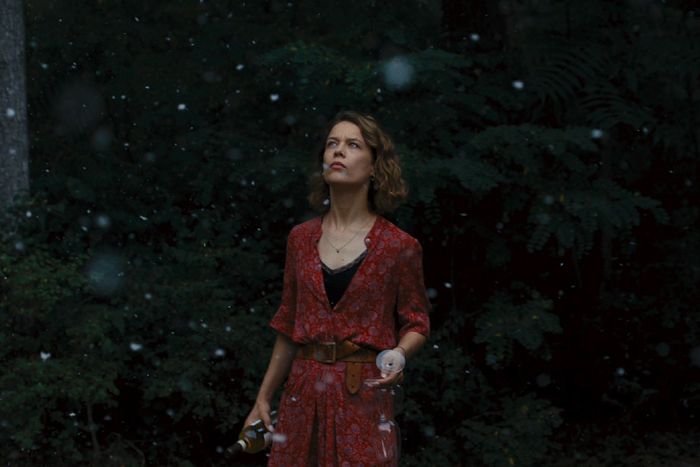
Afire is about vacationing against a backdrop of disaster. Leon (Thomas Schubert), a writer, and Felix (Langston Uibel), a photographer, are headed to the Baltic coast, to a beach house that belongs to Felix’s mother. Fires are raging in the forest nearby, not close enough for the two friends to cancel their plans, but at a proximity that gives their otherwise sunny seaside getaway an unsettled air. Helicopters keep passing overhead, the hotels are empty, and in town, a truck blares out an announcement about how camping, barbecuing, and smoking have been banned for the season. One night, they stand on the roof and look at the baleful red glow on the horizon. Would it be overreacting to leave, or foolish to stay? They’re 20-somethings who sometimes seem as though they’re waiting on an adult to tell them what to do, but at the same time their youth feels like an impenetrable bubble. How could something as momentous as death dare intrude on their summer idyll of romantic longing and petty fighting?
Seriousness does eventually descend on Afire like the check at the end of a meal, but until then the film, the latest feature from German filmmaker Christian Petzold, is a beguilingly funny affair about getting in your own way. Leon, its irritable protagonist, has written a bad second novel and knows it, and readies for a visit from his publisher, Helmut (Matthias Brandt), with the air of someone waiting on a fatal diagnosis. In the meantime, however, he directs his insecurity and defensiveness outward at his unlucky companions — the genial Felix as well as Nadja (Paula Beer), a seasonal worker also staying at the house, and later her occasional lover, Devid (Enno Trebs), who’s working as a lifeguard. Schubert, an Austrian actor with the soft features and pallor of a committed indoor kid, lands his performance perfectly between dickishness and absurdity. When he sits on the beach, fully clothed in black and clutching a book of literary essays, Leon is his own punchline, but there’s a self-awareness to his compulsive pompousness. After insisting he can’t go for a swim because his “work won’t allow it,” he sits alone with his head in his hands and castigates himself for being an asshole.
With close quarters comes intimacy, and despite Leon’s attempts at joy-killing, he’s captivated by Nadja, treating her with tetchiness but watching her intently when she isn’t looking. Beer has starred in Petzold’s last three films and is generally seen as having taken the place of his past collaborator and regular leading lady Nina Hoss, and here plays a mix of the earthy and the ethereal. Nadja is introduced by way of the mess she’s left in the kitchen, and then the loud sex she’s heard having through the walls, but when she actually appears onscreen, she’s a sylph in a red dress who sees right through Leon, but who nevertheless has more patience for his bluster than anyone else. It’s easy to understand why Leon is attracted, however resentfully, to Nadja. What’s less easy to suss out is how she’s supposed to feel about him, as she dances just out of reach, a lightly amused object of desire navigating the emotions and tensions that eddy around the small house. Beer makes for a striking figure, standing out in a rain of ash from those not-so-distant flames or riding her bicycle alongside the sea in the bright afternoon. But she retains that touch of remove even through the film’s coda, as though Nadja isn’t a character the film is able to bring entirely into focus.
A thread runs through Afire about vulnerability in life and art, connecting the snippets we hear of Leon’s snide, posturing manuscript with the more considered writing he does later, after being marked by the events of the film. But I found Afire’s turn toward urgency to be its least compelling part. Tragedy will eventually crash its way into any life, even ones who’ve had the good fortune of stretching on for decades without being touched by it. Leon’s transformation is just so quick, as if his brush with mortality through the flames tempered him like steel, changing him not only as a person but also making him a better artist. What lingers about Afire for me is instead that stunning scene of the characters on the roof, looking at the distant glow of the approaching inferno — a piercing image of being young in a world that’s on fire, and being unsure of whether to carry on or to panic.
More Movie Reviews
- The Thriller Drop Is a Perfect Addition to the Bad-First-Date Canon
- The Accountant 2 Can Not Be Taken Seriously
- Another Simple Favor Is So Fun, Until It Gets So Dumb


